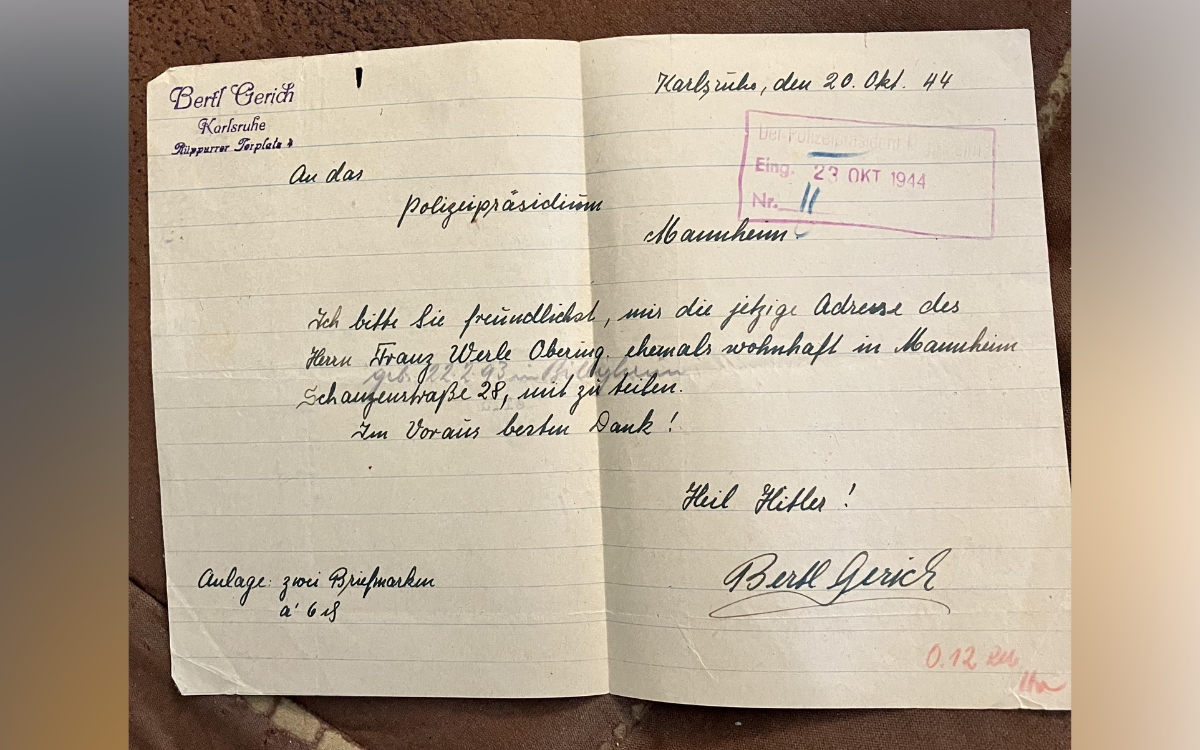A New York man looking through his great grandmother’s belongings has shared a letter he discovered among the assorted items bearing a surprising two-word sign-off.
David Schofield from upstate New York told Newsweek he found his mom going through an old box of things that had once belonged to his great grandmother Bertl when she said there were some letters in there that might be of interest.
Bertl was from Karlsruhe in Germany. “She lived near the castle there,” Schofield said. “Bertl’s daughter Heidi, my grandmother, married a U.S. soldier stationed in Germany some time after the war and moved to the States with him.”
Bertl had been in her twenties during World War II, and Schofield was intrigued to see what form her written communications would have taken during that period. One letter, and its distinctive sign-off, quickly caught his eye.
“I looked through the letters and found that one,” Schofield said. “It was interesting.” The one in question was dated October 20, 1944 and read, according to translation:
To the Mannheim Police Headquarters,
I kindly request that you inform me of the current address of Mr. Franz Werle Obering, born on 22.02.93 in [illegible], formerly residing in Mannheim, Schanzenstraße 28. Thank you in advance.
Enclosed: two 6-pfennig stamps
An das Polizeipräsidium Mannheim
What was notable about the letter, however, was that his great grandmother signed off with the words “Heil Hitler.”
Schofield never really knew his great-grandmother. “I only met her once or twice when I was very young, and we did not speak the same language,” he said.
He added that neither his great-grandmother or anyone else in the family was a Nazi, but seeing those two words included in the letter did give him pause for thought.
Though letter writing was an important and widely used way of communicating with friends and family at a time when telephone communication was rare, it came with plenty of risks during World War II.
As the United States Holocaust Memorial Museum says, letter writing was a highly controlled activity that was the subject of “systematic censorship.”
“Censorship rules and practices were not clear,” the museum said. “In addition to avoiding the obvious topics that were not to be discussed—criticism of Nazi leaders, acts of resistance, other ‘criminal’ activities, etc.—each writer had to navigate an uncharted territory of self-censorship, coded references, and bold statements.”
Failing to sign off with “Heil Hitler” could have conceivably landed the writer in trouble, had those reading the note interpreted it as a sign of defiance.
Reddit/U/Bogoogs
From Schofield’s understanding, it was “legally required” for letters to be signed in this particular way during the war. But seeing it on the page brought home the reality of his great grandmother’s situation.
“I felt sad for the position she and, I’m sure, many other Germans were in, being under Nazi rule. It’s difficult to imagine having a government in place, where you have to fear for potentially your life, with something as simple as a closing statement in an innocent letter.”
One eagle-eyed viewer on Reddit sympathized with this, noting that the letter was written to a police station. “Of course she would have signed off like this,” they said.
There were some who criticized the great grandmother’s adherence to the rules, but Schofield gave them short shrift, responding to one: “I suppose it’s easy for someone completely detached 80 years later to say ‘you should have rebelled and broken the laws of a dictatorship that tortured people for their ethnicity.’ I’m sure that would have been worth her life, to you.”
Bertl survived the war. While Schofield’s grandmother moved to the U.S. and changed her name, letters like this serve as a reminder of where his family came from and what they and countless others lived through. Sadly, many millions did not.
Uncommon Knowledge
Newsweek is committed to challenging conventional wisdom and finding connections in the search for common ground.
Newsweek is committed to challenging conventional wisdom and finding connections in the search for common ground.
